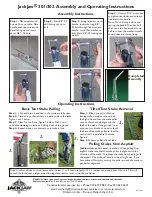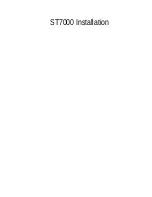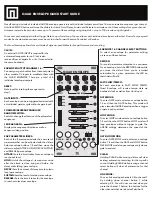
– 14 –
1. BASIC SAFETY PRECAUTIONS
WARNING: Negligence of these instructions can lead to accidents.
■
Supplying fuel and oils
• Spilled fuel or oil will be slippery. Wipe up immediately. Keep the filler caps tight. Do not use
fuel as a flushing oil. Handle fuel and oil in a well ventilated area.
■
Check the coolant level in the radiator
• To check the coolant level, shut down the engine and allow the engine and radiator to cool
down before removing the radiator cap. Remove the cap by covering it with a rag before
removing to prevent any fluid that could spray under pressure from causing a burn.
■
Illumination
• For inspecting the level of the fuel, oil, coolant and
battery electrolyte, use burn-proof illuminations.
Failure to use this type of illumination can result in an
explosion.
1.11 During Servicing
■
Keep unauthorized persons away
• During service, do not allow persons not concerned
to enter the work area, particularly when grinding or
welding operation is performed or heavy hammers are
being used.
■
Keep your machine clean
• Spilled oil, grease or scattered debris are dangerous. Always keep your machine clean.
Moisture that penetrates into the electrical system can cause malfunctions. Do not use
water to clean sensors, connectors and the operator’s station.
■
When repairing the electrical system
• For repairing the electrical system or for conducting
welding, disconnect the negative cable from the battery
to shut off the electricity.
■
Carefully handle high pressure hoses
• Do not try to bend or hit hoses against a hard object. Do not use hoses or pipes that are
bent or damaged. They will burst.
• Replace damaged fuel hose and hydraulic hoses. An oil or hydraulic fluid spill can cause a
fire.
– 15 –
1. BASIC SAFETY PRECAUTIONS
WARNING: Negligence of these instructions can lead to accidents.
■
Be careful of high pressure hydraulic fluid
• Bear in mind that the working equipment hydraulic
systems are under internal pressure. Do not perform
adding, draining, inspection or servicing of the hydraulic
systems until the internal pressure has been relieved.
Hydraulic fluid leaking through a fine hole at high pressure
can penetrate your skin and eyes. Inspect any leakage by
holding a hard board close to suspected leaks and wear
goggles. If skin or eyes are penetrated by high pressure
oil, get medical help immediately.
■
Be careful of hot parts
• After the machine has been operated for some time, the
coolant, engine oil and hydraulic fluid will become hot.
• Removing the radiator cap or draining the coolant or oil
can burn you. Perform this work in accordance with correct
procedures after the systems have cooled down.
■
Use care when inspecting or servicing fan or belts in motion
• Secure loose clothing and keep articles away that could
get caught in moving parts.
• Do not let your body or tools make contact with the fan
blades or belts. Moving fan belts and blades can cause
serious injury or death.
■
Used oil disposal
• Do not throw used oil into a drain or waterway. Drain the
oil from the machine into a proper container. Do not drain
directly on the ground.
• Obey all local, state and federal environment regulations
for the proper disposal of oil, fuel, coolant, battery
electrolyte or any other fluids.
■
Exercise extreme care when replacing and repairing tires
• Disassembly, repair and reassembly of tires require
special facility and knowledge. Have them repaired at work
shop specialized in handling tires.
• Improperly fitted rim can separate if the tire is inflated.
When inflating tires, do not work in front of the rim. Use
correct inflation pressure.
• When dismounting a tire, chock other tires for safety.
• When welding job is carried out near the tires, use
extreme care, as this can cause an explosion of the tires.
Summary of Contents for SV410-2
Page 4: ......
















































